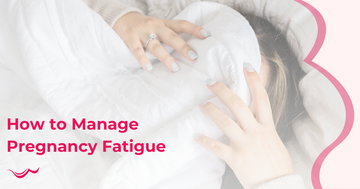Vitamins to Avoid During Pregnancy
by Nikki Warren on May 02, 2022

During pregnancy, getting your nutrition right is important for both you and your growing baby. As an expectant mama, you want to provide proper nutrition that contributes to giving birth to a healthy baby.
While taking prenatal vitamins or other supplements can give you the comfort of knowing your baby is getting the best nutrition. Precautions must be taken to make sure that it's the right amount. Because during pregnancy, getting too much or too little of certain nutrients can have negative effects.
Vitamins & Minerals to Avoid During Pregnancy
Vitamin A
Vitamin A is crucial for the development of a baby's embryonic organs. Including its heart, lung, kidney, eye, bone, and circulatory, respiratory, and nervous systems.
However, when taken in high doses, vitamin A can affect foetal growth and cause teratogenesis, or birth defects in an embryo. Vitamin A and retinoids can cause malformations of the skull, face, limbs, eyes, and central nervous system in the developing foetus.
So, how much vitamin A is safe to consume during pregnancy?
According to the WHO's 2013 guidelines, routine supplementation with vitamin A during the prenatal period is not recommended to reduce maternal or infant complications or survival.
The recommended daily intake of vitamin A during pregnancy is 800mcg retinol equivalents.
Cod liver oil can vary in the amount of vitamin A that it contains and should be used cautiously.
Milk, eggs, and salmon are good sources of vitamin A and foods high in betacarotene such as carrots, apricots and green leafy veggies can convert into vitamin A in the body as needed.
Copper
Copper rises naturally during pregnancy as the oestrogen levels rise. There is evidence to show that high copper in blood is associated with anxiety, depression and insomnia. For this reason, it is wise to avoid copper containing supplements during pregnancy and breastfeeding. Unless a blood test shows you are deficient.
Choose capsules over tablets
There is a reason the NaturoBest range is encapsulated in vegan-friendly capsules, rather than hard tablets. To make a hard tablet (as opposed to a chewable tablet) you must add a lot of excipients to make it bind.
This includes fillers, disintegrates, a film coating and usually a colour in the coating. These excipients may contain ingredients that are undesirable such as titanium dioxide. Chewable tablets require less excipients because there is no film coating and therefore no requirement for a colour to be added.
All prenatal vitamins and preconception vitamins in the NaturoBest range contain only two added excipients, microcrystalline cellulose and ascorbyl palmitate. It is rare to find supplements with only two added excipients - most contain magnesium stearate because it is cheaper to manufacture.
Vitamins to be Cautious With During Pregnancy
Vitamin E
Although vitamin E deficiency is rare among healthy adults, inadequate intake during pregnancy can have serious complications. Including preeclampsia and small babies.
Vitamin E and pregnancy are interlinked to each other. By widening blood vessels, vitamin E prevents the clotting of blood. To get an adequate serving of Vitamin E eating foods rich is vitamin E is crucial. Foods high in vitamin E may include vegetable oils, nuts, cereals and some leafy green vegetables.
On the other hand, high dosages of Vitamin E can act as a blood thinner which is dangerous near birth. Taking blood thinners may increase the risk of postpartum haemorrhage. The recommended daily intake during pregnancy is 7mg and this is easily achieved through diet.
Vitamin K1
The main types of vitamin K in the human diet are Vitamin K1 and Vitamin K2.
Vitamin K1 promotes blood clotting and for this reason, it is best for you to consume Vitamin K1 through your diet. Load up on leafy green vegetables like spinach, broccoli and kale.
Vitamin K2 helps to improve bone health by directing calcium to the bones instead of the arteries. This is why it is prudent to include vitamin K2 in a calcium supplement. Vitamin K2 has been found to decrease fracture rates and increase bone mineral density in osteoporosis patients.
Sadly, Vitamin K deficiency is a much more frequent problem among infants. This problem is called VKDB, which stands for vitamin K deficiency bleeding. Vitamin K1 has very poor placental transfer. Therefore, there is no point in supplementing with high doses of vitamin K1 during the pregnancy in the hope of avoiding vitamin K supplementation for your newborn baby.
You will be offered a vitamin K-1 injection for your newborn bub at birth to protect them from life-threatening bleeding. However, you can ask your health care provider for a prescription for oral vitamin K drops. These can be administered to bub yourself three times over a few weeks.
Vitamin D
Newborns' vitamin D levels mostly depend on their mothers. Therefore, pregnant women should keep an eye on her vitamin D levels throughout pregnancy.
Vitamin D is known to help regulate and absorb calcium and phosphorus in the body. It aids development of your baby’s bones, teeth, kidneys, heart, and nervous system.
The recommended daily intake of vitamin D in pregnancy is 200iu. Although many women need more than this to sustain adequate levels. 4000iu is the absolute maximum a doctor would prescribe during pregnancy. Higher levels than this can cause hypercalcemia and health issues for both mum and bubs.
It is worthwhile checking vitamin D through a blood test at the end of each trimester. You may then supplement according to the advice of your health practitioner if needed.
Foods to avoid during pregnancy
Liver or liver products such as pate are high in vitamin A and should be avoided during pregnancy in case of overdose.
Fish with high mercury level: Fish that hoards high levels of mercury such as tuna should be avoided. Consuming mercury during pregnancy may cause developmental delays or brain damage. During pregnancy, the Food and Drug Administration (FDA) encourages you to avoid fish including shark, swordfish, king mackerel, and tilefish. The bigger and older the fish, the more mercury it's likely to contain.
Avoid undercooked meat, poultry, and eggs
You're more likely to get bacterial food poisoning during pregnancy. And worse, your reaction might be more severe than if you weren't pregnant.
Avoid unpasteurised foods
These products can contain various types of bacteria, including listeria, salmonella, and E. coli.
Processed meat
These meats contain nitrates and listeria. During pregnancy, both of these have been shown to produce serious complications. Any meats that come already prepared or contain additives should be avoided.
Poorly washed fruits and vegetables
Do not eat unwashed raw fruits and vegetables. It is not enough to just rinse the surface with water to remove bacteria and other chemicals that lurk on it. Scrub them as thoroughly as possible as you wash them or better still, switch to organic fruit and veggies.
Conclusion
A balanced nutrient dense diet is the best way to provide you with the necessary vitamins and nutrients you need for pregnancy. However, vitamin supplements are beneficial in ensuring that you’re receiving enough nutrients. Remember that if consumed in moderation, it will benefit you as a mama and your unborn child.
NaturoBest is by your side on your journey to healthy, happy motherhood. For high quality pre-pregnancy and prenatal vitamins, check out our premium range.




